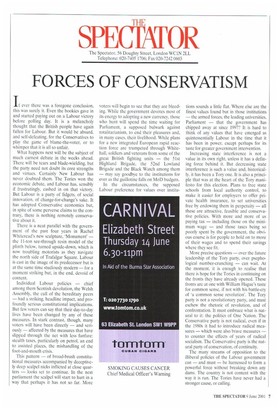FORCES OF CONSERVATISM
If ever there was a foregone conclusion, this was surely it. Even the bookies gave in and started paying out on a Labour victory before polling day. It is a melancholy thought that the British people have again fallen for Labour. But it would be absurd, and self-defeating, for the Conservatives to play the game of blame-the-voter, or to whimper that it is all so unfair.
What happens next will be the subject of much earnest debate in the weeks ahead. There will be tears and blade-wielding, but the party need not doubt its core strengths and virtues. Certainly New Labour has never doubted them. The Tories won the economic debate, and Labour has, sensibly if frustratingly, cashed in on that victory. But Labour is a party of fidgets, of social innovation, of change-for-change's sake. It has adopted Conservative economics but, in spite of some perverse claims to the contrary, there is nothing remotely conservative about it.
There is a neat parallel with the government of the past four years in Rachel Whiteread's new sculpture, 'Monument' — the 11-ton see-through resin model of the plinth below, turned upside-down, which is now troubling motorists as they navigate the north side of Trafalgar Square. Labour is cast in the image of its predecessor but is at the same time studiously modern — for a moment striking but, in the end, devoid of content.
Individual Labour policies — chief among them Scottish devolution, the Welsh Assembly, the cull of the hereditary peers — had a striking, headline impact, and profoundly serious constitutional implications. But few voters can say that their day-to-day lives have been changed by any of these measures. In stark contrast, though, many voters will have been directly — and seriously — affected by the measures that have slipped through the net with less fanfare: stealth taxes, particularly on petrol, an end to assisted places, the mishandling of the foot-and-mouth crisis.
This pattern — of broad-brush constitutional measures accompanied by deceptively deep scalpel nicks inflicted at close quarters — looks set to continue. In the next parliament the scalpel will start to hurt in a way that perhaps it has not so far. More voters will begin to see that they are bleeding. While the government devotes most of its energy to adopting a new currency, those who hunt will spend the time waiting for Parliament, a supposed bulwark against totalitarianism, to end their pleasures and, in many cases, their livelihood. While plans for a new integrated European rapid reaction force are trumpeted through Whitehall, soldiers and veterans from some of the great British fighting units — the 51st Highland Brigade, the 52nd Lowland Brigade and the Black Watch among them — may say goodbye to the institutions for ever as the guillotine falls on MoD budgets.
In the circumstances, the supposed Labour preference for values over institu tions sounds a little flat. Where else are the finest values found but in those institutions — the armed forces, the leading universities. Parliament — that the government has chipped away at since 1997? It is hard to think of any values that have emerged as quintessentially Labour in the time that it has been in power, except perhaps for its taste for greater government intervention.
Increasing state interference is not a value in its own right, unless it has a defining force behind it. But decreasing state interference is such a value and, historically, it has been a Tory one. It is also a principle that was at the heart of the Tory manifesto for this election. Plans to free state schools from local authority control, to make it easier for employers to offer private health insurance, to set universities free by endowing them in perpetuity — all these are attractive, feasible and conservative policies. With more and more of us paying tax — including those on the minimum wage — and those taxes being so poorly spent by the government, the obvious course is for people to hold on to more of their wages and to spend their savings where they see fit.
More precise questions — over the future leadership of the Tory party, over psephological number-crunching — can wait. At the moment, it is enough to realise that there is hope for the Tories in continuing on the fronts they have already opened. These fronts are at one with William Hague's taste for common sense, if not with his battle-cry of 'a common sense revolution'. The Tory party is not a revolutionary party, and must eschew the rhetoric of revolution, and of confrontation. It must embrace what is natural to it: the politics of One Nation. The Conservative party is not radical, even if in the 1980s it had to introduce radical measures — which were also brave measures — to counter the effects of years of radical socialism. The Conservative party is the natural party of conservation, of continuity.
The many streams of opposition to the illiberal policies of the Labour government can — and must — be harnessed to form a powerful force without breaking down any dams. The country is not content with the way it is run. The Tories have never had a stronger cause, or calling.


































































 Previous page
Previous page